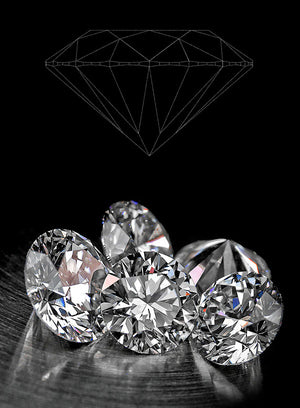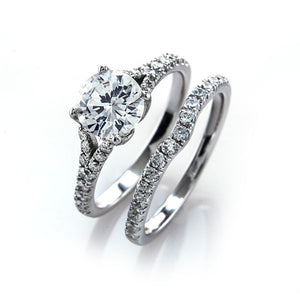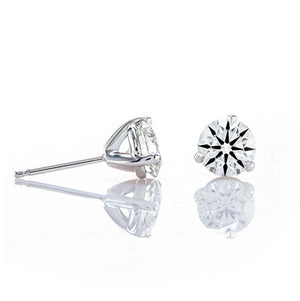
Gemstone 101: birthstone meanings
The mystery behind where birthstones came from and the meaning behind each gem dates back to the breastplate of Aaron, which is mentioned in the Bible. It is from this passage that gemstones' cultural meanings are thought to have been born. In 1912, The American National Association of Jewelers created a birthstone list, which is accepted worldwide today as the definitive list of birthstones. No matter what meaning or symbolism you choose to believe, incorporating one's gemstone into a custom engagement ring design is a surefire way to create a one-of-a-kind piece of jewelry.
January
Garnet: According to the American Gem Society, the birthstone for the month of January (and the Aquarius zodiac sign) is a garnet. The word garnet is said to be derived from the word granatum, which translates to seed. The pyrope garnet, which is widely recognized as the birthstone for January, was thought to resemble a pomegranate seed, and thus came the name for the gemstone. This particular stone dates back to 3100 B.C. Egypt. Today, the most common areas in the world where garnets are procured include Africa, South America and parts of Europe.
February
Amethyst: The color amethyst is a blend of violet and red hues. The gemstone has been acclaimed throughout history as one of the stones worn by royalty, especially during the Middle Ages. Amethysts are actually derived from quartz; to be considered real amethyst, the stones must be a medium purple hue with flecks of rose.
March
Aquamarine: The birthstone for the first month of spring is aquamarine. This particular gemstone can range in color from an almost colorless pale blue to a shade of teal. The stone was believed to keep sailors safe during long voyages and ward off seasickness. The most valuable aquamarine stones are typically mined in Brazil, however, the stone is commonly found in Africa, Asia and parts of the Middle East.
April
Diamond: The top diamond mining location is Africa, followed by Venezuela, Australia, Brazil and Russia. Diamonds are considered one of the most prestigious of all the gemstones and are commonly used to for engagement rings, wedding bands and anniversary jewelry.
May
Emerald: The term emerald is derived from the Greek work, "smaragdus," which translates to "green." According to the American Gemstone Society, emeralds date back as far as 330 B.C., when they were discovered by the Egyptians. The finest emerald stones are procured in Brazil and Columbia.
June
Pearl: The official birthstone of the first month of summer is the pearl. This particular stone is the only gemstone that is derived from a sea creature, rather than in the ground. Pearls have adorned royals for centuries, but it wasn't until the 1920s that the first cultured pearls hit the market, ultimately replacing natural stones.
July
Ruby: Rubies are derived from the species corundum and are extremely rare. Rubies have been found in many areas of the world, including India, East Africa, South America and the United States.
August
Peridot: The beautiful peridot gemstone is formed deep inside the earth and is only brought to the surface by volcanoes. Today, peridot gemstones can be found specifically in the states of Arizona and Hawaii, as well as Burma, Norway and on the Middle East.
September
Sapphire: Like rubies, the September gemstone sapphire is also a result of corundum. Sri Lanka and Madagascar are two countries that are well known for sapphire mining.
October
Tourmaline: The word tourmaline is derived from the Sri Lanka word, "tura mali," which roughly translates as "the stone of mixed colors." These stones are mined around the world, including South Africa, the United States, Afghanistan and Brazil, to name a few countries.
November
Topaz: The birthstone of November is commonly referred to as imperial topaz due to the stones association with 18th and 19th century Russian czarinas. The orange and pink stone can be found in Brazil.
December
Tanzanite: Tanzanite is the birthstone for those born in December. The gemstone was found back in the 1960s in Tanzania and is often purchased as a substitute for sapphire stones.
















